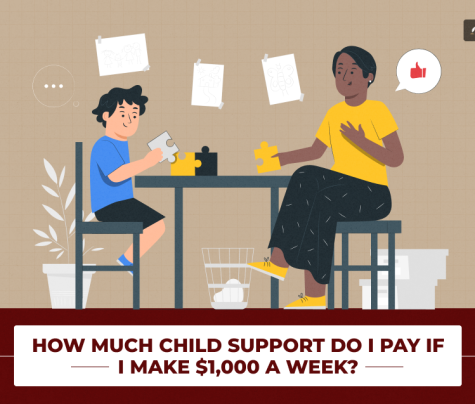
“Oh! So you are in a single parent family situation? Darling, you don’t know how much trouble you are going to face!”
If you have heard this from multiple people, you are not alone. At the same time, the statement or the comment is not entirely incorrect.
Being a single parent comes with unique challenges, and one of the most pressing concerns is child support. Ensuring your child’s financial well-being is paramount, and understanding the intricacies of child support laws is crucial.
In this blog, I will shed light on some lesser-known aspects of child support that can significantly impact your financial situation.
From calculating child support payments to understanding modifications and enforcement, we will cover everything you need to know.
Therefore, whether you’re a parent seeking child support or a non-custodial parent paying it, this information will empower you to make the right decisions and protect your child’s future.
So, keep on reading this blog till the end to learn more…
Understanding a Single-Parent Family
Single-parent families are becoming increasingly common, and they face unique challenges that require specific considerations when it comes to child support.
These families can arise from various circumstances, including divorce, separation, death, or never having been married.
Single-parent families come in all shapes and sizes. Mothers head some, while fathers lead others. Some families have one parent and one child, while others have multiple children.
The dynamics within these families can vary widely, depending on factors such as the parent’s age, the child’s age, and the reason for the single-parent status.
Single parents often face significant financial challenges. They may have to juggle multiple responsibilities, such as working, caring for their children, and managing household chores.
This can make providing for their children’s needs difficult, especially if they are the sole breadwinner.
Child support can be a crucial source of income for single-parent families, helping ensure their children have access to the resources they need to thrive.
Being a single parent can have a profound emotional impact. Single parents may experience feelings of stress, anxiety, or loneliness.
They may also face challenges related to co-parenting, especially if the other parent is involved in the child’s life. Single parents need to seek support and resources to help them cope with these challenges.
Child support is essential for single-parent families. It helps to ensure that children have access to the necessities of life, such as food, clothing, shelter, and education.
Child support can also help cover healthcare expenses, extracurricular activities, and childcare.
For many single parents, child support is a lifeline that allows them to provide a stable and supportive environment for their children.
What Does Child Support Cover?
Child support is a financial obligation that one parent pays to the other parent to help support their child or children.
A court typically determines the specific amount of child support based on factors such as the income of both parents, the number of children, and the cost of living in the area.
Child support primarily covers the basic necessities of a child’s life. This includes:
- Housing: Rent or mortgage payments for a place where the child lives.
- Food: Groceries and meals for the child.
- Clothing: Clothes, shoes, and other essential items.
- Healthcare: Medical expenses, including doctor’s visits, prescriptions, and dental care.
- Education: School tuition, books, supplies, and extracurricular activities.
In some cases, child support may also cover additional expenses, such as:
- Childcare: Costs associated with daycare or babysitting.
- Transportation: Costs for transportation, such as car payments, insurance, or public transportation.
- Extracurricular activities: Costs for sports, hobbies, or other activities.
The amount of child support awarded can vary depending on several factors, including:
- Income: The income of both parents is a primary factor in determining child support. The parent with the higher income will typically pay more.
- Number of children: The more children there are, the higher the child support obligation will likely be.
- Cost of living: The cost of living in the area where the child lives can also affect child support. If the cost of living is higher, the child support may also be higher.
- Special needs: If a child has special needs, additional expenses related to those needs may be factored into the child support calculation.
When Can You File for Child Support in a Single-Parent Family?
The timing of filing for child support in a single-parent family can vary depending on the circumstances. So, when can you file for it?
Here are some common scenarios when you may be eligible to file for child support:
After Divorce or Separation:
If you are a single parent due to divorce or separation, you can typically file for child support as soon as the divorce decree is finalized. The court will often include provisions for child support as part of the divorce settlement.
Before Divorce or Separation:
Sometimes, it may be possible to file for child support before a divorce or separation is finalized. However, the specific requirements for doing so can vary depending on state laws.
It’s advisable to consult with a family law attorney to determine if you can file for temporary child support.
When a Child is Born Out of Wedlock:
If you are a single parent and the child was born out of wedlock, you can generally file for child support at any time after the child’s birth. You must establish the paternity of the child before you claim for a child support order.
When the Other Parent is Not Paying:
If you are already receiving child support but the other parent is not making consistent payments, you can take steps to enforce the existing child support order.
This may involve filing a motion to modify the order or seeking help from the child support enforcement agency.
If Your Circumstances Change:
If your circumstances change significantly, such as a change in income or the child’s needs, you may be able to modify the existing child support order.
For example, if your income increases or the child’s expenses rise, you may be eligible for a higher child support payment.
How to File for Child Support After Divorce
Filing for child support after a divorce can be complex, but understanding the steps involved can help you navigate the system more effectively.
Here’s a general guide to help you get started:
Gather Necessary Documents:
- Before filing for child support, you’ll need to gather certain documents. These may include:
- Divorce decree: This document outlines the terms of your divorce, including any provisions related to child custody and visitation.
- Income documentation may include pay stubs, tax returns, and bank statements.
- Child-related expenses: Gather receipts or estimates for child care, healthcare, and education expenses.
Determine the Appropriate Jurisdiction:
Child support is typically handled by the state where the child resides. Determine your state’s correct court or agency that handles child support matters.
Complete the Necessary Forms:
You’ll need to complete specific forms to initiate the child support process. These forms may vary depending on your state, but they generally include:
- Application for child support: This form collects information about you, your child, and the other parent.
- Financial Affidavit: This form details your income, expenses, and assets.
Submit Your Application:
Once you’ve completed the necessary forms, you can submit them to the appropriate court or agency. You may be able to submit the forms online, by mail, or in person.
Attend a Hearing:
After you submit your application, you may be scheduled for a hearing to determine the amount of child support. You and the other parent will present evidence to support your claims at the hearing.
Receive the Child Support Order:
If the court determines that the other parent should pay child support, you will receive a child support order. This order will outline the amount of child support, payment schedule, and other relevant terms.
Enforce the Child Support Order:
If the other parent fails to make child support payments, you can take steps to enforce the order. This may involve contacting the child support enforcement agency in your state.
In a Single Parent Family, Child Support is a MUST
Child support is not just about financial transactions; it is a crucial pillar in supporting single-parent families. It plays a vital role in ensuring the well-being of children.
By recognizing the importance of child support, society acknowledges the shared responsibility of parents. It seeks to create a supportive environment that nurtures the growth and development of children in single-parent households.
Ultimately, child support acts as an assurance, empowering single parents to provide their children with the care, resources, and opportunities they deserve.
Read Also:
- Divorce Law: What Happens in a Divorce?
- A Comprehensive Guide To Personal Injury Lawsuits
- How to Find a Good Criminal Defense Attorney Easily and Win the Case











0 Reply
No comments yet.